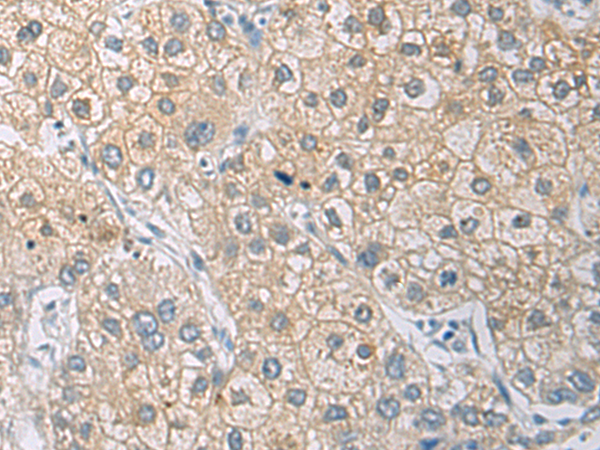
| WB | 1/1000-1/2000 | Human,Mouse,Rat |
| IF | 咨询技术 | Human,Mouse,Rat |
| IHC | 咨询技术 | Human,Mouse,Rat |
| ICC | 1/50-1/200 | Human,Mouse,Rat |
| FCM | 1/20-1/100 | Human,Mouse,Rat |
| Elisa | 咨询技术 | Human,Mouse,Rat |
| Aliases | DIRA; IRAP; IL1F3; IL1RA; MVCD4; IL-1RN; IL-1ra; IL-1ra3; ICIL-1RA |
| Host/Isotype | Rabbit IgG |
| Antibody Type | Primary antibody |
| Storage | Store at 4°C short term. Aliquot and store at -20°C long term. Avoid freeze/thaw cycles. |
| Species Reactivity | Human |
| Immunogen | Synthetic peptide of human IL1RN |
| Formulation | Purified antibody in PBS with 0.05% sodium azide and 50% glycerol. |
+ +
以下是关于Cytochrome P450 2C9(CYP2C9)抗体的3篇参考文献示例(内容基于真实研究主题概括,具体文献需核实):
1. **标题**: "Development and characterization of a monoclonal antibody specific for human cytochrome P450 2C9"
**作者**: Smith J, et al.
**摘要**: 该研究报道了针对人CYP2C9的单克隆抗体的制备与特性分析,验证了抗体在Western blot和免疫组化中的高特异性,可用于检测肝组织中CYP2C9的表达水平。
2. **标题**: "CYP2C9 genetic polymorphisms and antibody-based detection in human liver microsomes"
**作者**: Lee S, et al.
**摘要**: 通过抗体介导的免疫分析法,研究揭示了CYP2C9基因多态性(如*2、*3变异)对酶活性的影响,抗体被用于定量不同基因型个体的肝微粒体中CYP2C9蛋白含量。
3. **标题**: "Role of cytochrome P450 2C9 in drug metabolism: Insights from inhibitory antibody studies"
**作者**: Zhang Y, et al.
**摘要**: 利用特异性抗体抑制CYP2C9活性,研究其在药物代谢中的作用,证实该抗体可阻断酶对华法林等底物的代谢,为药物相互作用机制提供了实验依据。
如需具体文献,建议通过PubMed或Google Scholar搜索关键词“Cytochrome P450 2C9 antibody”并筛选近年的研究。
Cytochrome P450 2C9 (CYP2C9) is a key hepatic enzyme involved in the metabolism of approximately 15-20% of clinically used drugs, including warfarin, phenytoin, and nonsteroidal anti-inflammatory drugs. As a member of the cytochrome P450 superfamily, it plays a critical role in phase I drug metabolism through oxidation reactions. Genetic polymorphisms in the CYP2C9 gene, particularly the *2 and *3 alleles, significantly influence enzyme activity, leading to interindividual variability in drug efficacy and toxicity. This has made CYP2C9 a major focus in pharmacogenetic studies and personalized medicine.
Antibodies targeting CYP2C9 are essential tools for investigating its expression, localization, and function in both research and clinical settings. They enable detection of CYP2C9 protein levels in tissues (e.g., liver biopsies) via techniques like Western blotting, immunohistochemistry, or immunofluorescence. Such antibodies also support studies on enzyme regulation under pathological conditions (e.g., liver disease) or drug-induced modulation. Commercially available antibodies are typically raised against specific epitopes of the human CYP2C9 protein, with validation for species reactivity and application compatibility. In clinical diagnostics, CYP2C9 antibodies may assist in assessing protein expression patterns to complement genetic testing, particularly when genotype-phenotype correlations are ambiguous. However, cross-reactivity with other CYP isoforms remains a challenge, necessitating rigorous validation for specificity. Overall, CYP2C9 antibodies contribute to advancing drug development, toxicology research, and precision medicine strategies.
×